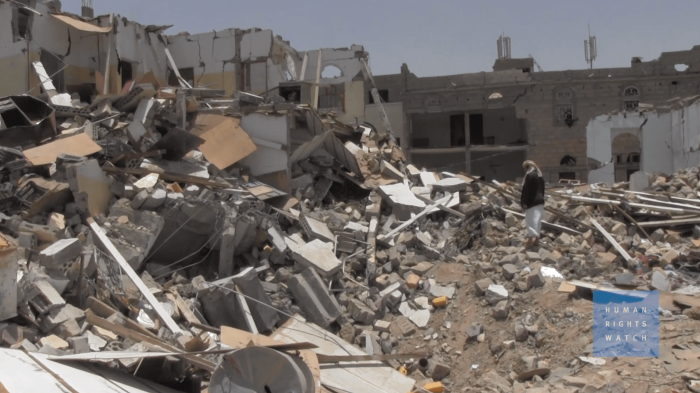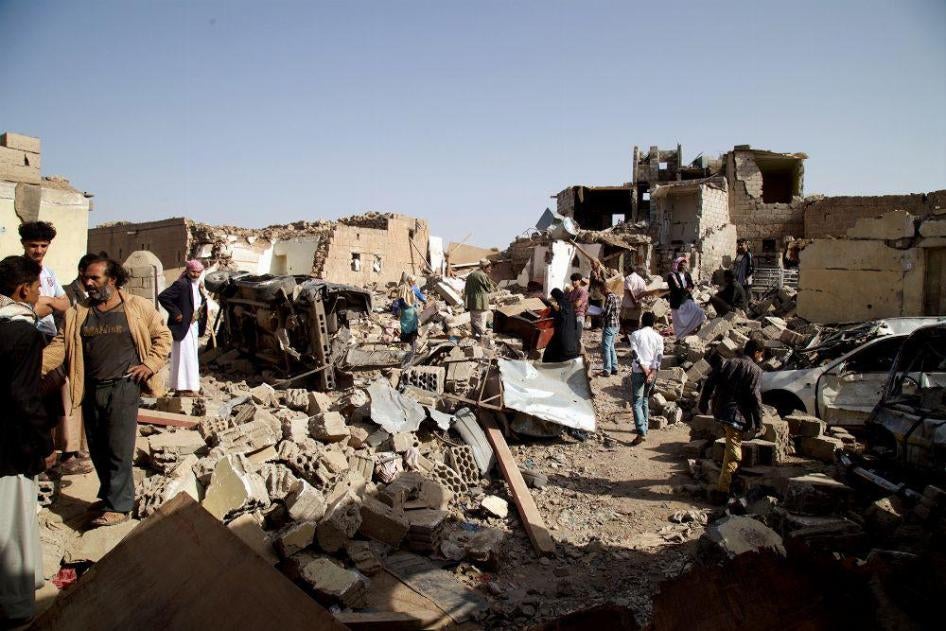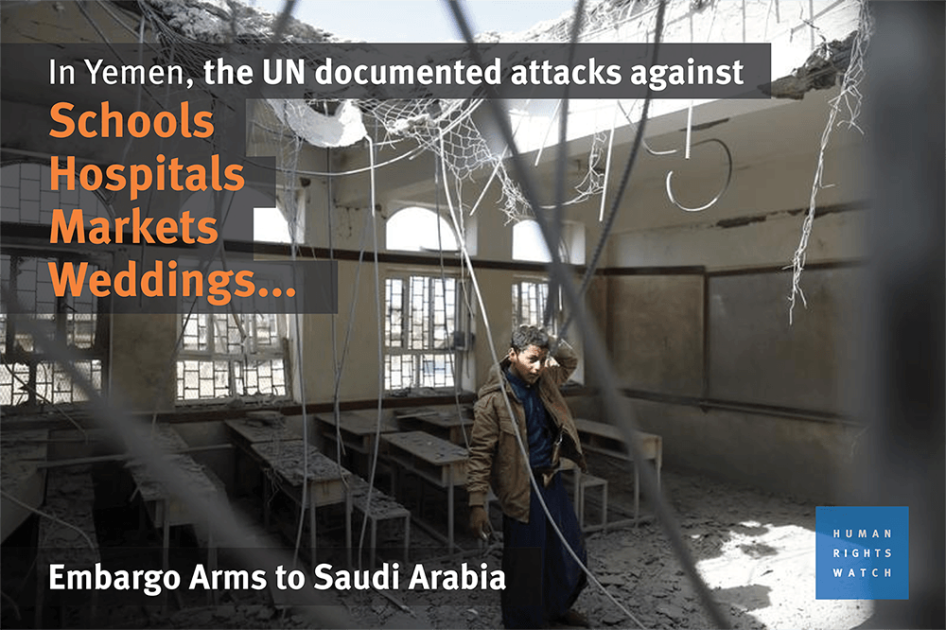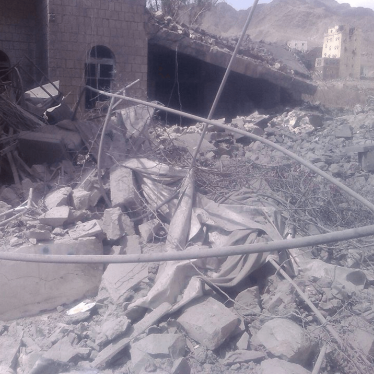(Sanaa) – The United States, United Kingdom, France, and others should suspend all weapon sales to Saudi Arabia until it not only curtails its unlawful airstrikes in Yemen but also credibly investigates alleged violations.
Since March 26, 2015, a coalition of nine Arab countries has conducted military operations against the Houthi armed group and carried out numerous indiscriminate and disproportionate airstrikes. The airstrikes have continued despite a March 20 announcement of a new ceasefire. The coalition has consistently failed to investigate alleged unlawful attacks as the laws of war require. Saudi Arabia has been the leader of the coalition, with targeting decisions made in the Saudi Defense Ministry in Riyadh.
For the past year, governments that arm Saudi Arabia have rejected or downplayed compelling evidence that the coalition’s airstrikes have killed hundreds of civilians in Yemen,” said Philippe Bolopion, deputy global advocacy director. “By continuing to sell weapons to a known violator that has done little to curtail its abuses, the US, UK, and France risk being complicit in unlawful civilian deaths.”
Nongovernmental organizations and the United Nations have investigated and reported on numerous unlawful coalition airstrikes. Human Rights Watch, Amnesty International, and other international and Yemeni groups have issued a joint statement calling for the cessation of sales and transfers of all weapons and military-related equipment to parties to the conflict in Yemen where “there is a substantial risk of these arms being used… to commit or facilitate serious violations of international humanitarian law or international human rights law.” Human Rights Watch has documented 36 unlawful airstrikes – some of which may amount to war crimes – that have killed at least 550 civilians, as well as 15 attacks involving internationally banned cluster munitions. The UN Panel of Experts on Yemen, established under UN Security Council Resolution 2140 (2013), in a report made public on January 26, 2016, “documented 119 coalition sorties relating to violations” of the laws of war.
Saudi Arabia has not responded to Human Rights Watch letters detailing apparent violations by the coalition and seeking clarification on the intended target of attack. Saudi Arabia has successfully lobbied the UN Human Rights Council to prevent it from creating an independent, international investigative mechanism.
In September 2014, the Houthis, a Zaidi Shia group from northern Yemen also known as Ansar Allah, took control of Yemen’s capital, Sanaa. In January 2015, they effectively ousted President Abdu Rabu Mansour Hadi and his cabinet. The Houthis, along with forces loyal to former president Ali Abdullah Saleh, then swept south, threatening to take the port city of Aden. On March 26, the Saudi-led coalition, consisting of Bahrain, Kuwait, Qatar, the United Arab Emirates, Egypt, Jordan, Morocco, and Sudan, began an aerial bombing campaign against Houthi and allied forces.
At least 3,200 civilians have been killed and 5,700 wounded since coalition military operations began, 60 percent of them in coalition airstrikes, according to the UN High Commissioner for Human Rights. The naval blockade the coalition imposed on Yemen has contributed to an immense humanitarian crisis that has left 80 percent of the population of the impoverished country in need of humanitarian protection and assistance.
According to the London-based Campaign Against Arms Trade, the UK government approved GB£2.8 billion in military sales to Saudi Arabia between January and September 2015. The weapons include 500-pound Paveway IV bombs. The UK is negotiating a £1 billion weapons deal with the UAE.
A June 2015 Spanish government report stated that Spain had authorized eight licenses for arms exports to Saudi Arabia worth $28.9 million in the first half of the year. In February 2016, Spanish media reported that the government-owned shipbuilding company Navantia was about to sign a contract worth $3.3 billion with Saudi Arabia for the construction of five Avante 2200 type frigates for the Saudi navy.
In July 2015, Saudi Arabia reportedly signed agreements worth $12 billion with France, which included $500 million for 23 Airbus H145 helicopters. The kingdom is also expected to order 30 military patrol boats by 2016 under the agreement. Reuters reported that Saudi Arabia has also recently entered into exclusive negotiations with the French company Thales Group to buy spy satellite and telecommunications equipment worth “billions of euros.”
Coalition Violations
Human Rights Watch has documented 36 airstrikes between March 2015 and January 2016, that appear to have been unlawfully indiscriminate or disproportionate, which include a March 30, 2015 airstrike on a camp for internally displaced people that killed at least 29 civilians and a March 31, 2015 airstrike on a dairy factory outside the port city of Hodaida that killed at least 31 civilians. In Saada, a Houthi stronghold in the north, Human Rights Watch examined more than a dozen airstrikes that occurred between April and May that destroyed or damaged civilian homes, five markets, a school, and a gas station, though there was no evidence these sites were being used for military purposes. These strikes killed 59 people, mostly civilians, including at least 35 children.
On May 12, the coalition struck a civilian prison in the western town of Abs, killing 25 people. On July 24, the coalition dropped nine bombs on and around two residential compounds of the Mokha Steam Power Plant, which housed plant workers and their family members, killing at least 65 civilians. On August 30, an airstrike hit Al-Sham Water Bottling Factory in the outskirts of Abs, killing 14 workers, including three boys, who were nearing the end of their night shift.
The coalition has carried out strikes on marketplaces, leading to high civilian death tolls. On May 12, a strike on the marketplace of the eastern village of Zabid killed at least 60 civilians. On July 4, an airstrike on the marketplace of the northern village of Muthalith Ahim killed at least 65. On July 6, bombs hit two markets in the governorate of Amran, north of Sanaa, killing at least 29 civilians.
On October 26, the coalition bombed a Doctors Without Borders (MSF) hospital in the northern town of Haydan in Saada governorate six times, wounding two patients. Since then, coalition airstrikes have hit MSF facilities twice. An airstrike hit a mobile clinic on December 2, in Taizz, wounding eight, including two staff members, and killing another civilian nearby. On January 21, an airstrike hit an MSF ambulance, killing its driver and six others, and wounded dozens in Saada.
On January 10, a projectile hit an MSF-supported hospital in Saada, killing six people and wounding at least seven, most of them medical staff and patients. MSF said it could not confirm the origin of the attack, but its staff had seen planes flying over the facility at the time of the attack. MSF said on January 25, that it had yet to receive any official explanation for any of these incidents.
On May 8, 2015, Brig. Gen. Ahmad al-Assiri, the military spokesman for the coalition, declared the entire cities of Saada and Marran, another Houthi stronghold, to be military targets. In an interview with Reuters on February 1, al-Assiri spoke about Saudi civilian casualties from Houthi and pro-Saleh forces’ firing across the border. He said, “Now our rules of engagement are: you are close to the border, you are killed.” Treating an entire area as the object of military attack violates the laws-of-war prohibition on attacks that treat distinct military objectives in a city, town or area as a single military objective. Doing so unlawfully denies civilians protection from attack.
Human Rights Watch also documented the coalition’s use of at least six types of cluster munitions in at least 15 attacks in five of Yemen’s 21 governorates between March 2015 and January 2016. Cluster munitions are indiscriminate weapons and pose long-term dangers to civilians. They are prohibited by the 2008 Convention on Cluster Munitions, adopted by 118 countries, though not Saudi Arabia or Yemen.
Failure to Investigate Alleged Violations
Countries that are party to a conflict have an obligation under international law to investigate credible allegations of war crimes and hold those responsible to account. Human Rights Watch has seen no indication that the Saudi Arabia-led coalition has conducted any meaningful investigations into alleged laws-of-war violations.
On August 19, 2015, Human Rights Watch and 22 other human rights and humanitarian organizations called on the UN Human Rights Council to create an independent international commission of inquiry at its September session to investigate alleged laws-of-war violations by all parties to the conflict. The UN High Commissioner for Human Rights similarly called on UN member states to encourage the establishment of an “international independent and impartial” investigative mechanism.
Instead, on September 7, President Abdu Rabu Mansour Hadi of Yemen established a national commission to investigate violations of human rights and the laws of war. During the ensuing UN Human Rights Council session in Geneva, Saudi Arabia and other Arab countries effectively blocked an effort led by the Netherlands to create an international investigative mechanism. The national commission has taken no tangible steps to conduct investigations, nor has it revealed any working methods or plans, three people close to the commission told Human Rights Watch.
Five days after the release of UN Panel of Experts report on Yemen, on January 31, 2016, the coalition announced a new committee to assess the coalition’s rules of engagement in the war and produce recommendations for the coalition to better respect the laws of war. “The goal of the committee is not to investigate allegations,” Al-Assiri said. “Its primary goal is to confirm the precision of the procedures followed on the level of the coalition command.” As such, this proposed body does not meet the requirements for an impartial investigative mechanism that can address accountability for unlawful attacks or compensate victims of coalition violations, Human Rights Watch said.
Al-Assiri said that the Saudi military has been conducting internal investigations into attacks in which a violation might have ensued, and pointed to a single airstrike that had led to a violation: the October 26, 2015 bombing of an MSF hospital in northern Yemen. He said the strike had been the result of “human error,” but did not outline any steps taken to hold the responsible military personnel to account, or compensate the two civilians wounded in the strike.










